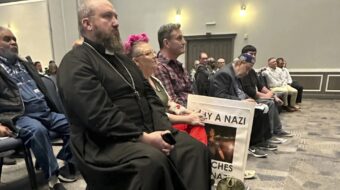An African American woman from Akron, Ohio, has been handed a felony conviction for allegedly fudging residency records to get her children into a better school. This news obliges us speak out on the ongoing problems of racism and residential segregation in our country.
Akron public housing resident Kelley Williams-Bolar, an African American single mother, knew that her two daughters, aged 12 and 16, were not getting a good education in the local school, so she got them into a better school in a mostly white suburban school district, Copely-Fairlawn, by claiming that she lived with her father in that area. She says she actually was living part-time with her father; local authorities beg to differ.
Copely-Fairlawn school authorities found out, and had her prosecuted for defrauding their school district. The logic was that per pupil expenditures in Copely-Fairlawn are much higher than in the slums of Akron, so outsiders should not be registered in Copely-Fairlawn unless they pony up $800 a month in tuition, impossible for poor people. A blinkered judge and jury agreed with this, and Williams-Bolar was sentenced to 10 days in jail for records tampering, and must somehow “repay” $30,000 to the Copely-Fairlawn school district. Worst of all, she now has a felony conviction which, under Ohio law, will cut short her ambition to become a schoolteacher.
Here’s the scoop: Thousands and thousands of poor, mostly minority people in inner city communities have tried to do this over the years. Williams-Bolar said she was afraid for her children because of a burglary at her house. Probably millions of families in poor working class neighborhoods have the same fear, namely that their children will become victims of crime if they somehow can’t be moved to another school in another community. The Ohio case is unusual because of the draconian penalty.
I would wager that extremely few wealthy white suburbanites have tried to get their kids registered in poorly performing schools in the inner city slums.
As Anatole France put it: “The law, in its majestic equality, forbids the rich as well as the poor to sleep under bridges, to beg in the streets, and to steal bread.” We might add, to fudge residency papers so as to get their kids into a different school.
But why, 56 years after Brown versus Board of Education, do we still have millions of poor children studying in de-facto segregated, poorly equipped and overcrowded inner city schools, while in wealthy, overwhelmingly white suburbs, children study in brand new schools which lack nothing, in personnel, equipment or support needed for a high quality education?
Why can’t people like Ms. Williams-Bolar move to the suburbs if they want their kids to go to a suburban school?
When Lorraine Hansberry wrote “A Raisin in the Sun,” African American families were stopped at the borders of the suburbs by explicitly racist local laws and “covenants” which are illegal nowadays. Today, African American and Latino people trying to get out of the slums are stopped by “race neutral” local zoning and tax laws. The question of race or racism is never mentioned, but the intention is the same and the results are the same. To “maintain the unique quality of our community” local governments and zoning boards make sure that there is no affordable rental housing, and that single-family homes are expensive enough to keep the riff-raff away. Sometimes, working class families pool their funds so as to be able to buy a house in which all can contribute to the mortgage payments. Typically, zoning or fire-safety rules will then be invoked to run them out.
Suburban “bedroom” communities are often set up with the specific purpose of making it possible for better off, mostly white people to live comfortably without having to deal face to face, or through their taxes, with the problems of our society.
Sometimes, inner city families have been so eager to get their kids out of the slums and into better schools that they have overextended themselves by getting mortgages they really can’t afford. Now many are about to lose their investments. In addition to this anguish, they have to listen to people who criticize them for trying to raise themselves above their station by getting out of the ghetto.
The media tell us that Ms. Williams-Bolar’s plight is causing indignation all over the country. Let us hope so, and that this indignation does not turn out to be a nine-day wonder, but instead leads to action to end residential and school segregation, as well as the institutional racism that pervades our society, now!












Comments